5 Movies That Taught A Lesson Its Characters Totally Ignored
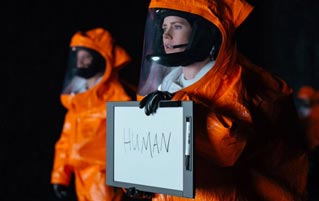
Movies usually have some kind of point -- a lesson or character arc that makes us feel like we gained something from those two hours, aside from a sore butt and a collection of oily popcorn stains. But sometimes the lesson the writers think we should be learning isn't the one the characters themselves learn. Take, for example ...
The Main Character Of Creed Still Exploits His Father's Legacy
Creed, the latest (and final, if the gods are merciful) installment of the Rocky series, pushes Rocky into a supporting role, and instead follows the aptly named Adonis Creed, the son of Rocky's onetime rival, Apollo Creed. Adonis is an unfulfilled office worker who lives in his dead father's mansion, but since this is a boxing movie, you know that what he really wants to do with his life is punch people unconscious inside a roped-off square.

"But how will I, gifted with genetic superiority and essentially unlimited resources, make this dream a reality?"
The thing is, he wants to distance himself from his father and make it on his own. He goes by the surname "Johnson" to avoid anyone knowing who he is, and whenever someone mentions it, he tells them "I don't know him. Ain't got nothing to do with me." When he moves to Philly in order to seek out Rocky as his trainer, he insists "Every punch I've ever thrown is my own," and that Apollo has nothing whatsoever to do with his ambition or success. And when he finally gets that big fight against the world champion, he got there on his own, not as a shadow of his famous father.
Of course, none of that makes any sense. Are you kidding? It has everything to do with his father. From the very beginning, he's only able to quit his job, move across the country, and train full-time without taking on a side job is because of Apollo's ridiculous wealth.

This was not a man of austerity.
The only way he's able to convince a long-retired Rocky to be his trainer is, again, because of his dad. Anyone else who mentions Apollo to his face is likely to get punched out, but Adonis doesn't approach Rocky under his pseudonym -- he name-drops his dad within two minutes.
Then he's offered a showcase fight on HBO despite being woefully inexperienced. Why? Because they can promote him as Apollo Creed's son. So does he reject the offer to pad his record and organically build up his own following so he can eventually earn the shot on his own? Nope, he changes his name back and goes with it.

Why waste all that time grinding when you can visit a trainer and jump to Level 80?
Adonis Creed isn't a great underdog; he's a privileged kid who is tone-deaf to the advantages life has given him and thinks he got everything on his own. It could've been called Trump.
InArrival can probably best be described as a "linguistics thriller," which isn't the kind of thing anyone would put on the back of a DVD case to entice reticent viewers. Audiences may have expected a fun alien invasion movie, but what they got was a bunch of linguists poring over alien hieroglyphics and parsing out nouns and suffixes for two hours.

And lots of uncomfortable alien fluid expulsion.
Dr. Louise Banks is in a race against time, trying to decode the alien visitors' language before some panicky government decides to launch a preemptive nuke. Banks wants to talk it out, explaining: "Language is the foundation of civilization. It is the glue that holds a people together. It is the first weapon drawn in a conflict."
When someone translates one of the alien messages as "offer weapon," everyone else goes crazy, while Banks tries to remain calm and remind everyone that "language is messy," and they might be misinterpreting a completely benign statement. Her constant repetition of the fact that communication is of the utmost importance makes her sound less like a linguist and more like a marriage counselor. This is why it's so weird that she doesn't apply the same principle to, you know, her marriage.

"Instead of jumping straight to nukes, why don't we try some 'I feel' statements?"
See, unlocking the secrets of the alien language grants Banks the power to see the future, somehow. And when she looks forward in time, she knows that she's going to marry Jeremy Renner's character, have a child with him, and that child is going to die from cancer. And she doesn't tell him. Instead she cryptically asks him: "If you could see your whole life from start to finish, would you change things?" To which he replies, "Maybe I'd say what I felt more often. I don't know." And that's it. That's the extent of their communication on the subject before she takes his hand and leads him down a path to certain heartbreak and tragedy.

Though with a proposition like that, how could she say no?
Of course, anyone truly obsessed with the ambiguity of language should know that "I don't know" can mean anything from "I don't understand" to "I don't care" to "This conversation is making me uncomfortable." Maybe a better question would be "If you knew before you conceived a baby that they would die of cancer while still young, would you still make the baby? On a related note, I have alien precognition powers now, and if we have a baby, she's going to die of cancer while still young." You know, communication.
The Cheerleading Squad InIn Bring It On, Kirsten Dunst plays Torrance, the captain of her high school cheerleading team "the Toros," who are a national powerhouse in competitive cheerleading. When a new student joins the squad, she recognizes that the previous captain had been stealing their award-winning routines from the poor and predominantly black East Compton Clovers, a team that has never had enough money to go to competitions and prove the routines are theirs. Torrance is horrified by this, and the pressure is on to develop their own original routines before the national championship.

You know, the thing teams train the entire year for?
So how do they invent their own cheer routine in three weeks without stealing it from the impoverished black school on the other side of town? They don't! Instead they stitch together a Frankenstein of dance moves they cribbed from sources such as swing dancing, interpretive dance, martial arts, Bob Fosse routines, and even mime. Of course, the movie never points out the hypocrisy here. That's all white people stuff, right? Who cares? But in the real world, dance troupes get in trouble all the time for stealing from other choreographers -- including Beyonce, who was recently in hot water for copying her dances from a bunch of other sources ... such as Bob Fosse.
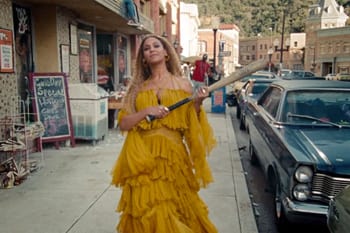
If you want to be the one to tell Beyonce no, you go right on ahead.
The East Compton Clovers wind up winning the championship, of course (the screenwriters aren't that oblivious), but the Toros come in a very close second. And Torrance never learned that stealing other people's intellectual property was wrong; she just learned it was wrong that she did it to poor black people. Which is something, we guess.
Adam Sandler's Character InIn Big Daddy, Adam Sandler plays Sonny Koufax, a slacker who lives off a legal settlement he got after a cab ran over his foot. During the opening credits, it's revealed that Koufax has a law degree, but can't be bothered doing anything with it -- a plot point that is never mentioned again until it becomes relevant at the very end. After his girlfriend leaves him for being a lazy asshole, he basically abducts a child in order to trick her into thinking he's at least passingly familiar with the concept of responsibility.
For half the movie, Koufax acts like a total asshole in ways only an Adam Sandler character knows how -- pissing on the door of a restaurant because a waiter enforced their bathroom policy, screaming at fast food workers because he arrived too late to order from the breakfast menu, etc.
Future parents and children would never have to know this horror.
He also constantly teases a female doctor for having paid for her medical degree by working at Hooters. Because even though she's now a working medical professional, the fact that she once put on a tight-fitting uniform and took a low-paying wage to get there makes her worthy of ridicule.
Meanwhile, there's an entire generation of millennials who would wear whatever the fuck you want if it means cutting down their student loans.
Of course, this is the whole moral of the film, right? After Koufax's scheme falls through (when his ex hooks up with an employed partner and doesn't run back to her slacker boyfriend just because he illegally acquired a mystery child), he tries to pawn the kid off on an orphanage. But when he finds that he's stuck with the child, he develops some perspective, and finally decides to pick his ass up and get a career.
Well, that's partly right. In the epilogue, after Koufax is forced to return the boy to his real father with no legal or social repercussions whatsoever, it's revealed that he finally took the bar exam and simply walked into a high-paying job at a law firm. After years of deliberate unemployment. Because that's how it works. And he celebrates, of course, at Hooters, with his new wife and real child. The punchline is that he sees his ex-girlfriend -- the one who smartly dumped his ass in the opening act -- working as a waitress there, and her boyfriend is the line cook. The movie fades to credits as Koufax and all of his friends point and laugh at them. What a couple of stupid assholes!
"Ha ha, losers. Well, let's get back to our real estate law practice. At least you know that industry will always thrive!"
This two-minute final scene completely changes the theme of the movie. People who temporarily take jobs beneath their station to make ends meet deserve ridicule, and Koufax was right all along. Why don't they walk into a senior corporate position like he did? Another question about this movie might be: Why did Hooters allow their name to be used in a film in which Adam Sandler hates on them literally every five minutes?
Mr. Keating From Dead Poets Society Wants His Students To Think Outside The Box, But Teaches Them The Box
In Dead Poets Society, Robin Williams plays John Keating, a zany English teacher at an upper-crust, all-white, all-male school who wants to teach his class to see the world from a different perspective. Because even ivory towers ... have windows.
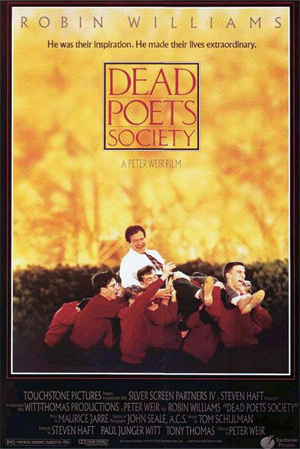
Shit, that should've been the tagline. If we ever master time travel, remind us of this.
Keating gets in trouble with his superiors for trying to break his students out of their regimented conformity and compelling them to question authority. The evil headmaster hits crisis point when one of Keating's students publishes an article suggesting that girls should be admitted to the school. Girls. He finally gets a pretext to fire Keating after one of his students commits suicide, but Keating's boys all stand on their desks and applaud him while he's marched out.
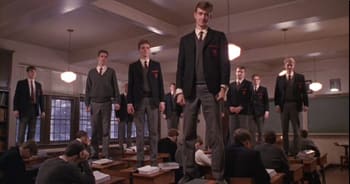
"Hey, you guys could give me some of your allowance, which is more than I make in a year, so I can feed my family. But nah, this is good too."
Admit it, you shed some tears. Flowed right down your perfect cheekbones. Dripped straight into your ascot.
So what were the dangerous ideas that Keating was teaching his students? The ones that busted them out of their white male cocoons like alien chestbursters? Why, he taught them the work of the great poets, such as Whitman, Tennyson, Thoreau, Frost, Herrick, and, of course, Shakespeare. What do all these poets have in common? They're the whitest and malest white males who ever whited a male.

In the advanced class, they explore diverse poets such as Longfellow, Hawthorne, and Bono.
Where was Maya Angelou? Claude McKay? Elizabeth Browning? Emily Dickinson? Frederick Douglass? Any of the Bronte sisters? There were like half a dozen Bronte sisters! These people were all prominent poets and writers by 1959, when the movie takes place. And if you ask Pulitzer Prize winner Junot Diaz, who's kind of a real-life Mr. Keating, he'll tell you: "If you don't want to deal and relate and think about what it means to be a woman in this planet -- you're going to have serious problems. The same with dealing with the question of ethnicity and race."
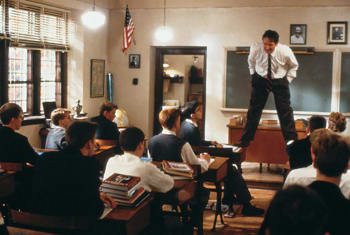
Weird, Hollywood is usually so good about those kinds of things.
Ironically, by teaching an all-white, all-male syllabus, Mr. Keating is reinforcing the same cultural homogeneity that he's trying to beat out of his students. It's almost as if this movie was made for and by upper-class white males. But that can't be right ...
Mr. Keating and co. weren't the only ones to miss the points of their own movies -- check out 5 Characters Who Totally Missed the Moral of Their Own Movie and 5 Feel-Good Movie Lessons Undone By Their Own Plots.
Subscribe to our YouTube channel, and check out The 4 Worst Lessons Disney Movies Taught Us as Kids, and other videos you won't see on the site!
Follow us on Facebook, and we'll follow you everywhere.